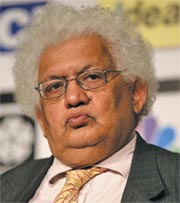While the Wall Street thought its
firms to be ŌĆśtoo big to failŌĆÖ, for themain
street ŌĆśtoo big to failŌĆÖmeant a financial
institution cannot be allowed to fail.
Do you agree with those who say that
Lehman had to fail in order for
Congress to have the political will to
pass any kind of rescue package?
Many more banks and financial
institutions should have been
allowed to fail. In my view the
mistake was not letting Bear Stearns
fail. In the case of a retail deposit
taking bank, you should guarantee
the depositors but then let the bank
fail so that the shareholders and bond
holders are not protected. It is better
to let banks fail and suffer immediate
consequences than to pile up a debt
which will take a long while to pay
off.
I
What did US Financial Crisis mean to global economy and the
business? How do you think the
governments and the businesses have
responded?
The global economy was enjoying the
fruits of American profligacy and
hence should have expected to pay
some of the price. Governments and
banks have responded much better
than they did in the 1930s.
’ĆĀWhat can be the lessons from this
crisis for ŌĆō governments and
businesses ŌĆō especially from the
point of view of public policy,
globalization, financial coordination
and information sharing? And also
from the viewpoint of developing
countries ŌĆō especially for the
emerging and BRIC economies ŌĆō and
developed countries?
This is a repeat of many questions
above. The lesson is that one must be
aware of the nature of globalization
and expect that periodically there
would be crises like this. It makes no
difference whether you are BRIC or
not.
How has Wall Street changed
during the past year, and what will
these changes mean for the stock
markets and the investors? Not
changed at all. Why should it ?
Intelligent players in markets should
be ready for the odd meltdown.
A lot has been said in the past 12
months about financial sector
reforms. In his speech (September 14,
2009), President Obama called it, ŌĆ£the
most ambitious overhaul of financial
regulatory system since the Great
Depression.ŌĆØ What new financial
regulations have been put in place,
what has been accomplished so far
and what remains to be done as far as
financial reforms go?
The reforms are still being debated in
the US and elsewhere. But they are
unlikely to be drastic. It will take two
or three more years before they take
shape.
ItŌĆÖs hard to talk about reforms
without talking about the reformers.Could you help us evaluate the
policies of Treasury Secretary Tim
Geithner and Federal Reserve
Chairman Ben Bernanke? Is there
anything that the regulators could
have done differently?
NO. Life is too short for that.
A year after the global economic
system collapsed, many companies
are finally finding ways to increase
profits under the new conditions.
However in a recent McKinsey
survey (September 2009) almost as
many expect profits to continue
falling and executives also indicate
that their broader financial hopes
remain fragile. Many expect
government involvement in
economies and industries over the
long term. Should that be the only
way out?
No more firms should fail. Fewer
should be rescued. Capitalism can
only work if companies undergo
market discipline.
A powerful tension is at work
today in global economic sentiment.
The financial markets, pundits, and
policy makers think the global
economy is out of the woods, but
executives arenŌĆÖt so sure. What
should be done in the short term and
in the long term to restore the
confidence and not get sucked up in
such hubris?
Nothing should be done. The
economy has recovered enough for
banks to be making profits again.
Output will revive and then
employment. You cant speed things
up too much. You only store up
trouble that way.
Governments have responded
vigorously with their bail out
packages and that meant in one sense
private losses being funded by public
money. Henrique Abreu cited a
lesson of the late Milton Friedman
that ŌĆ£it is a different thing spending
your money on someone else (Warren
Buffet) or spending someone elseŌĆÖs
money on someone else (government intervention). What is the efficacy of
government bailouts, especially for
the scale of bailouts doled out?
We will find out their efficacy in the
near future. I am against bailouts in
general.
American taxpayers have become
shareholders in AIG, GM, and so
forth. WhatŌĆÖs the exit strategy?
Sell when the companies recover.
Regulatory reform will mean
higher capital requirements for
financial institutions. WonŌĆÖt that limit
GDP growth?
NO.


